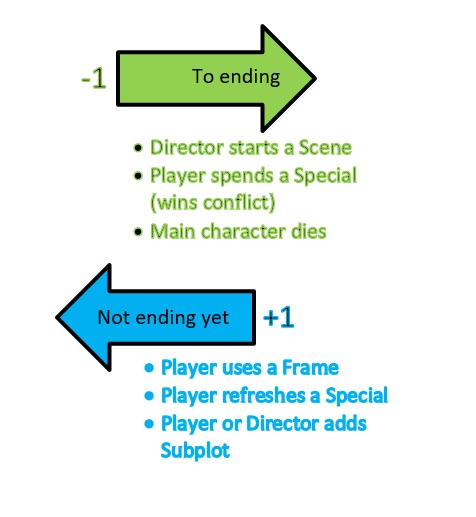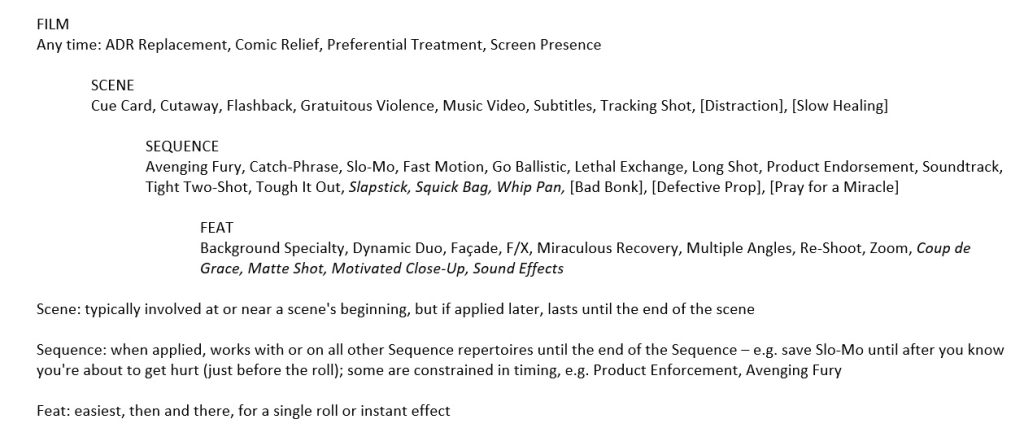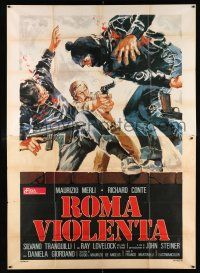I first encountered Be-Movie during Modena, a gaming convention in the city of that name, just about one year ago when I was running little consults at the Narrattiva tables. I confess I was suspicious about it. For one thing, the term “B movie” in hobby culture is almost always parodic, in the sense that making fun of something stupid is the automatic meaning or use of this medium and content. For another, the game was described right in the tradition of “we don’t need such desperation devices as dice when we have pure storytelling.”
All of this turns out to have been unfounded, or better, a relief in putting aside the suspicion, as it turns out to be mechanical in the best sense, such that the talking is both effective and focused. In the consulting so far, you’ve probably noticed that again and again, I refer to games with ostensibly diceless mechanics that they do too have dice, or “dice,” insofar as the rules for talking serve to make others’ statements into effective dice rolls for you. I was worried even after looking over the draft that Be-Movie was just bullshit pseudo-rules for everyone to talk freely and “agree because we love stories,” but fortunately, it’s actually a bit shocking how much punch the mechanics can have.
In fact, I think I shocked Helios and Gio a little bit with my chosen example to test that property, based on poliziotteschi film, which is notably callow and excessive to the point of willful stupidity. I insisted on it for a couple of reasons. I was clear about one of them in both videos, that B-movies are the beating heart of culture, and not just pop culture, and the best of them can be found nestled right there in all the same trappings as the (majority) worst, and in fact, they’d be found nowhere else. This genre is infamous for its nastiness, but it is not trivial in its relationship not only to Italian politics of a given era, but to the nature of police and public unrest world-wide. (My frequent reference to learn more about these ideas is Carol Clover’s excellent book Men, Women, and Chainsaws, which unfortunately is often cited as saying precisely the opposite of what it does say.)
The other and related reason is that I wanted to see whether play could handle quintessentially B-movie material which could not be converted into parody, which is also why our brief foray into play during the second video contains outright vile content from about minute 41 until about minute 49. I put in a text warning too. Skip that part, and if you don’t, please be aware that I was doing it for a purpose.
It’s probably not easy to understand the game just from the videos, and in fact, I had to construct a diagram as we went along. The crucial missing piece is seeing the frame-advancing play instrument Helios invented, which pulls a film-frame strip marked with numbers -1 through 7 in one direction or the other, showing one value through a window. You start with the number of players (maximum 5) +2, so say, in our case, we’d have started at 4. Then various rules move you -1 or +1 at a time, and when you hit the value -1 in the window, the story ends and the film is quickly wrapped up.

I hope you read that instead of just clicking on the video, because you’ll hear me getting repeatedly confused about which way you go based on what you do. When you’re using the physical device, it makes perfect sense, but trying to describe it led me to keep reversing the sign, because +1 seemed to me like you go forward toward the end when what it means is the opposite, another scene before getting to the end. I snipped out the parts where my confusion ruined the conversation, because I don’t want to look stupid.
The first video, with Gio and me, is here, and the second one with |Helios as well is presented below. Various problems led to both of them being audio-only, so I have made them into audio-visual experiences by heavily annotating them – which is important in this case – and including lots of supporting images. So watch’em rather than just listening, if you can.



7 responses to “B stands for Best”
Attachment?
Hi Ron,
I’m starting with the second video and it says you’ll have attached a document to this post! I guess you didn’t?
Oh right. Fixed.
Oh right. Fixed.
Please use the Contact link in the menu to tell me about things of this sort, not Comments.
Thanks! And will do.
Thanks! And will do.
Disagreement
The point about disagreement and rules not being something that resolves it is well made. I can not help but be reminded of duel of wits in Burning wheel for related, but very different, rhetoric.
As always, thanks for looking
As always, thanks for looking at these older posts and commenting. It makes a big difference to me.
I'm not sure who originated the phrasing that role-playing is "like cowboys vs. indians, except that we use dice to resolve arguments about 'bang bang, you're dead!'" It must have been some thought-leader in an influential venue during the 1980s or very early 1990s, because at about that time, it appeared in dozens of role-playing texts as received wisdom.
Let me know more about your thoughts on the Burning Wheel text or description. My copies are old versions so you might have to explain a little.
Burning wheel gold (revised I
Burning wheel gold (revised I have sold some years ago), duel of wits.
Page 390, two cherry-picked sentences sans context under the heading of «Agree to the terms»:
Page 402, from the summary of the duel of wits chapter, first point:
Huh. I remember there a more explicit imp thing about the DoW being for resolving arguments between players. Either I misremember or it vanished with Gold edition, as some other stupidities did.
Somewhat related, from page 73, chapter «The spokes in play», an imp under the heading «Versus tests revisited»:
Still not quite as strong language as I remember about the duel of wits or maybe dice rolling in general being explicitly about solving disputes between players.
Regarding Duel of Wits, the
Regarding Duel of Wits, the idea that it's a way to resolve conflict among players comes from Judd Karlman, and I think it is credited to him also in BW's text in Gold. I see his point, specially when it comes to endless table discussion among players who want to do different things regarding something. I sympathize, although I think that, regardless of such perceived issues, social conflict is still a valuable reason to engage with the dice and I don't see it as any different from any other kind of conflict in a game.
I think this is pure nonsense, because it basically implies that if it were not for this supposed "bullying, blustering, intimidation, manipulation, cajoling, persuasion and lying" then ideally we'd just be telling consensual stories, pass-the-conch style, making the story "we all want", all together singing Kumbaya. Personally I'd have no interest in playing such a game; I'd just write a novel instead.